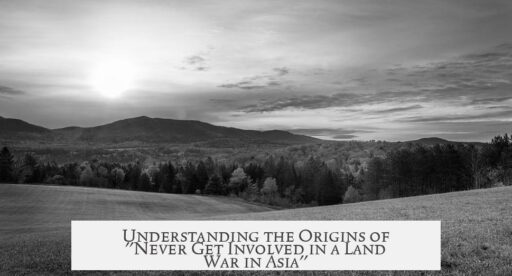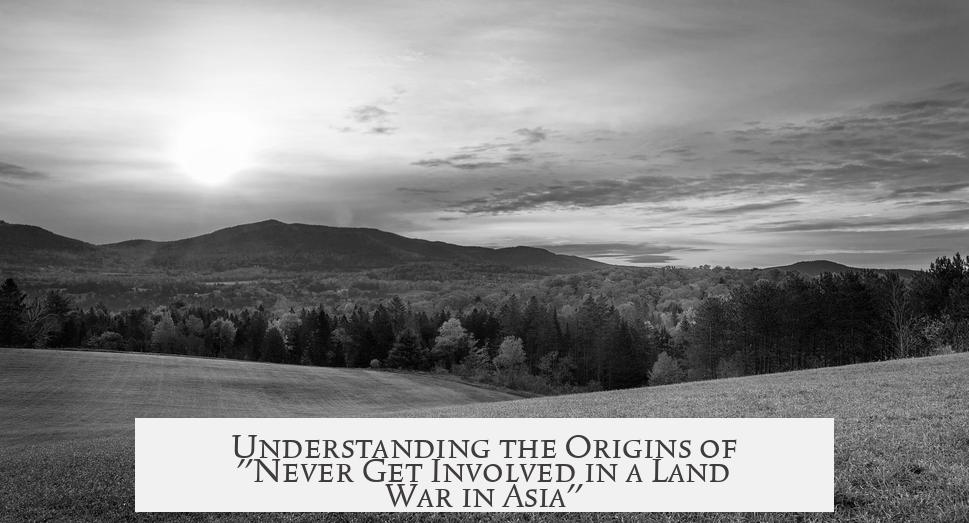The phrase “never get involved in a land war in Asia” is not a direct reference to a single war or historical event but rather a strategic principle rooted in lessons from multiple 20th-century conflicts. It is primarily attributed to Field Marshal Bernard Montgomery, a British WWII general, who framed it as his “Second Rule of War.” Montgomery first publicly articulated this view in 1962 during a House of Lords speech, emphasizing the inherent challenges of waging land warfare on the Asian mainland due to vast geography and unclear objectives.
Montgomery outlined two rules in his “book of war”: Rule One being “Do not march on Moscow,” reflecting the failures of past European invasions of Russia, and Rule Two cautioning against fighting land wars in China and broader Asia. He stated, “Don’t go fighting with your land armies in China. It is a vast country, with no clearly defined objectives.” He considered this advice particularly relevant when he criticized U.S. involvement in the Vietnam War during the 1960s, asserting that America had broken his second rule.
This strategic admonition does not single out one specific conflict but draws on patterns witnessed during World War II and subsequent wars. Specifically, the failures of Nazi Germany in the Soviet Union and Japan in China informed Montgomery’s perspective. The vastness of Asia, logistical difficulties, complex terrain, and political intricacies made sustained land campaigns exceptionally challenging for foreign powers.
While Montgomery coined the phrase in a recorded fashion, some historians suggest he may have borrowed or echoed sentiments expressed earlier by other military leaders. For example, Douglas MacArthur reportedly said in 1961 that “Anyone wanting to commit American ground forces to the mainland of Asia should have his head examined,” which carries a similar essence. Others speculate figures like Dwight Eisenhower or even Joseph Stalin might have influenced or contributed to the underlying strategic maxim, though no definitive attribution predates Montgomery’s known use.
The phrase, therefore, functions more as a strategic guideline rather than a direct citation from any single war. It encapsulates a broader lesson from history: land wars in Asia are often protracted, complex, and strategically unfavorable for invading forces. The key reasons include:
- Enormous landmass with difficult terrain.
- Unclear and shifting political objectives.
- Challenges in supply and logistics across remote regions.
- Local resistance bolstered by nationalistic or ideological motivations.
Historical examples supporting this principle include:
- The Vietnam War, where the U.S. encountered protracted guerrilla warfare and political quagmires.
- The invasion of the Soviet Union by Germany, highlighting the peril of extended campaigns in vast territories.
- The Second Sino-Japanese War, demonstrating difficulty in subjugating large Asian populations.
However, it is essential to note that history also records successful land campaigns in Asia. The Mongol Empire’s rapid conquests across Asia and beyond illustrate that land wars in Asia have had clear victors. Yet, these successes were exceptional and context-dependent, often involving different military, political, and technological conditions than modern warfare.
The phrase has transcended military advice to gain figurative usage. In business, politics, and diplomacy, it warns against engaging in overly complex and resource-draining conflicts or projects, particularly where local circumstances defy straightforward solutions or external control.
| Aspect | Details |
|---|---|
| Origin | Field Marshal Bernard Montgomery, early 1960s |
| Meaning | Strategic advice against land warfare in Asia due to complexity and scale |
| Historical Context | World War II, Vietnam War, and similar conflicts |
| Alternative Attributions | Douglas MacArthur, Dwight Eisenhower, Stalin (less evidence) |
| Figurative Use | Applies to complex, resource-heavy endeavors beyond warfare |
| Counter Examples | Mongol Empire’s successful Asian campaigns |
The phrase serves as a cautionary principle rather than a one-size-fits-all rule. It reflects the challenges faced by powers engaging in land campaigns in Asia but does not imply such endeavors are impossible or always doomed. Strategic, political, and technological contexts greatly influence outcomes.
- “Never get involved in a land war in Asia” is primarily a strategic maxim articulated by Bernard Montgomery.
- It draws on historical lessons from WWII and later conflicts like the Vietnam War.
- The phrase warns of the vast logistical and political challenges in Asian land warfare.
- Alternative origins exist, but Montgomery holds the earliest recorded claim.
- Successful Asian conquests exist but are exceptions rather than the norm.
- The phrase has broader metaphorical uses in contemporary language.
What historical events inspired the phrase “never get involved in a land war in Asia”?
The phrase reflects the difficulties faced by armies in Asia during the 20th century. Notably, World War II battles in China and the Vietnam War influenced this idea. It highlights the vastness and complex terrain of Asian lands.
Is the phrase directly linked to a specific war or battle?
No single war is the definitive source. It is a strategic rule attributed mainly to Field Marshal Montgomery but draws on multiple conflicts. It serves as a broad warning rather than referring to one exact event.
Who originally coined the phrase or rule about land wars in Asia?
Field Marshal Bernard Montgomery is the first to record the rule publicly in 1962. However, some suggest others like Douglas MacArthur may have expressed similar ideas earlier.
What does the phrase imply about fighting land wars in Asia?
It warns that land wars in Asia are difficult due to factors like vast geography and unclear objectives. Military powers often face strategic setbacks there.
Has this phrase been used beyond military contexts?
Yes, it’s often applied metaphorically to complex situations. For example, in business or politics, it warns against engaging in problems that are too large or complicated to handle effectively.




